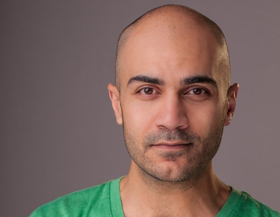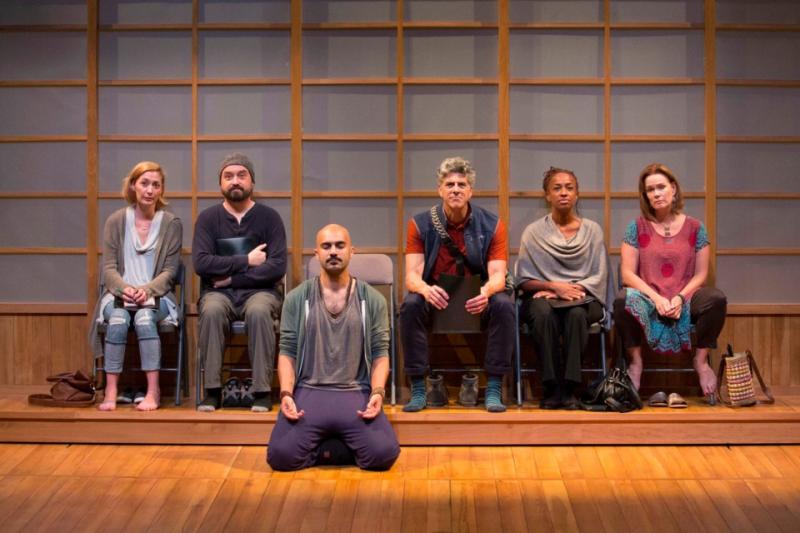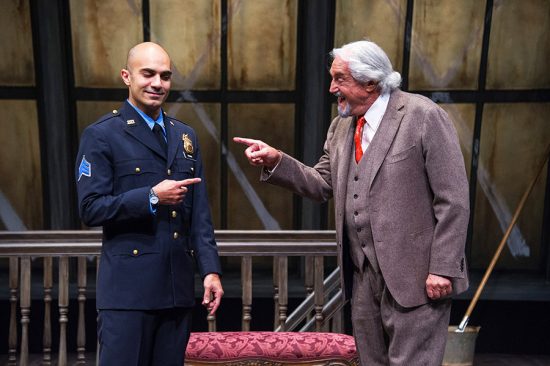Interview: Theatre Life with Maboud Ebrahimzadeh

Today's subject Maboud Ebrahimzadeh is one of the area's most versatile actors. Currently, you can see him in action in the very unique Small Mouth Sounds at Round House Theatre through September 23rd. The word unique, in this case, is meant as a compliment, but you'll have to see the show for yourself to understand why.
Maboud's area stage credits run the gamut from light comedies such as The Tale of the Allergist's Wife at Theater J and The Book of Will at Round House Theatre, to serious dramas such as The Last Days of Judas Iscariot at Forum Theatre and The Price at Arena Stage. On the classical side Maboud performed in Timon of Athens and Julius Caesar at Folger Theatre. Other area credits include The Invisible Hand at Olney Theatre Center; Mockingbird at Kennedy Center; Water by the Spoonful and Edgar & Annabel at Studio Theatre; and The Pillowman, Bobrauschenbergamerica, and Scorched at the unfortunately recently closed Forum Theatre.
Other regional credits include Murder on the Orient Express at Hartford Stage; Disgraced and Murder on the Orient Express at McCarter Theatre; Disgraced at Milwaukee Rep; The Invisible Hand [Barrymore Award for Outstanding Lead Actor] at Theatre Exile; The Liar at Gulfshore Playhouse; and The Container at Center Stage.
You might have also seen him on the small and big screens in Jessica Jones, Imperium, and Sally Pacholok.
Maboud Ebrahimzadeh is one of those actors whose performances always leave a lasting impression in the best possible way. Maybe that's why he is so in demand. Don't take my word for it though, see for yourself. Check out Maboud and a really wonderful ensemble of actors in Small Mouth Sounds at Round House Theatre for a truly spiritual theatrical experience.
Are you a native Washingtonian?
I was born in Iran, but have lived most of my life in the Washington Metro area so I consider myself a fairly native Washingtonian. When asked where I'm from, I say DC if that makes it any difference. Do I get points? Is this a points game? Am I winning?
How did you get interested in performing?
It was by accident, really. I was studying Medicine at Howard University in Washington, DC and then I transferred to Howard Community College in Columbia, Maryland to reassess my course of studies. I took an acting class on a lark because I thought it would be an easy A... and it was. I was immediately hooked. You can blame [Washington Stage Guild Artistic Director] Bill Largess for that.

Where did you receive your training?
Once I decided to continue studying Theatre and Film, I primarily took courses at Howard Community College and attended a few workshops outside of school. Other than that, I started working immediately and by some stroke of good fortune I haven't really stopped long enough to get more formalized training. Over the years, I've studied and read books on different techniques, philosophies, and approaches toward acting to add more tools to my toolbox. So now I've got my hammer, a bigger hammer, and a screwdriver too!
What was your first professional acting job and what do you remember about that particular opening night?
My first professional gig was at RepStage in Columbia, Maryland in Kasi Campbell's production of Hamlet. I played a sailor, a soldier, a servant, and... well, any character whose name started with an 'S'. I was there just trying to absorb as much as I could from all these amazing actors. Right before the big Hamlet and Laertes duel at the end of the play, I was supposed to enter behind Claudius carrying about fourteen champagne flutes on a small silver serving dish and distribute them silently... on a raked stage. Just before the cue light goes off, Nigel Reed, our Claudius, turns to me and says, "You're doing great, but don't forget, it's very important...More cowbell." And without a moment to spare, he enters, and I follow him on stage trembling, trying desperately to stifle laughter as the champagne flutes vibrate and rattle in a symphony of glass for what felt like an eternity. Somehow, I didn't drop a single one... that night.

Can you please tell us a little something about Small Mouth Sounds and your character?
Absolutely. Small Mouth Sounds is an unconventional play. It's probably unlike anything most people have seen. It takes place at a silent retreat, a la the Omega Institute in New York. Six very different characters watch and listen to an unseen guru as he leads them through their week-long silent adventure.
I play a semi-famous (or infamous) Yoga Instructor, Rodney, who, like the rest of the attendees, has come to this retreat with the hope of fixing something broken within himself.
Small Mouth Sounds is not your first time working at Round House Theatre. Can you please talk about your past experiences working there and what makes it such a great place to work for an actor?
I've worked at Round House Theatre on two other occasions, first in Bengal Tiger at the Baghdad Zoo (dir. Jeremy Skidmore) and The Book of Will (dir. Ryan Rilette). I am also a Resident Artist there for the next two seasons, meaning you'll be seeing more of me, and I'll be fulfilling some other artistic duties on the company side of things.
Artistic Director Ryan Rilette has made large strides in making Round House a welcome place for many actors. His dedication to cultivating and using local talent, producing new work, along with his general demeanor and attitude, creates an atmosphere of safety and growth for artists. The staff is also immensely supportive of the artists that work there. I've felt at home throughout my time with them and that's a pretty great feeling.

You recently appeared at Arena Stage in The Price opposite Hal Linden. What was it like sharing the stage with him?
Hal Linden. What a guy! He's fantastic. He was just a damn treat to work with. It's funny- here's this guy who's been in the business for decades, successful as they come, smart as a whip, full of humor and mirth, a great big heart, and as grateful and down to earth as a person can be. At first, I was worried I'd be getting that stereotypical "you're just a young buck, so listen to me" sort of treatment you'd expect from some other folks with his level of experience. And yet, there wasn't a day where he didn't treat me like a contemporary, an equal. There was a massive amount of mutual trust and respect between us on stage. We became fast, good friends and we still keep in touch. He's a rare breed. I only hope we get to play together again in something.
You worked at the unfortunately recently closed Forum Theatre on many productions. Smaller companies, in general, have a hard time surviving due to budgetary constraints and other reasons as well. Why is it important that we don't let smaller theatre companies just wither and close?
If you'll pardon the gestation-stage manifesto-
Education. Specifically, the education of young and emerging artists, the education of audiences, and the education of American Theatre.
I am of the mind that smaller theatre companies are bite-sized institutions of learning, and I say that with love and respect. I came up through college theatre, to community theatre, to small professional theatres, to large regional houses with 1,500 seats.
Here's a thought or two for each, though there are many more.
Education for the artists- smaller theatre companies are where the artists can cut their teeth. Actors, designers, writers, directors... for those that didn't go through undergrad straight into graduate school and wind up on the sweet end of the employment lollipop, small theatre companies are the places we were offered opportunities to hone our craft, to find our voices, to learn from others and each other. It's impossible to deny the opportunities for growth and development smaller theatre companies offer for artists. But they are more than just stepping stones for artists.
Education for the audience- smaller theatre companies by their very nature have a quality of boldness to them. Often, they take risks because they can afford to and because they can't afford not to. It's where they teach audiences that it's perfectly acceptable to have inclusive non-traditional casting and hiring. It's no secret that some larger theatres have passed the buck on inclusivity by saying things like "our audiences aren't ready to accept a person of color in that role". Surely showing them more of the same isn't going to change that, is it? Small theatre companies can move the needle and those that do deserve more credit than they get.
Education for American Theatre- smaller theatre companies introduce under-represented voices to the American Theatre. They help change the landscape for artists and audiences alike. Not every playwright comes out with a Pulitzer-winning play on their first try. Not all playwrights want to talk about simple topics that play well to all audiences. Some want to get in the muck and roll in with an audience. Not every play desperately needs to go to Broadway. Some plays affect change and evoke empathy more potent in a ninety-seat house. Those same writers and artists are shaping the landscape, even if in small increments.
I don't know if it is our responsibility to keep small companies afloat. Sometimes a company sets on out a mission, and if by some good fortune they feel they've reached their limit with that mission, then they face a decision, call it a day and close up, or change the mission. Some companies fold due to poor management, financial burdens, or lack of leadership. It is a shame to see them go sometimes.
So why is it important that we don't let smaller theatre companies just wither and close? Unless we're content doing the same 36 plays for the next few millennia, mainly, because we can't afford to. For the same reasons we can't afford to not invest in education.
After Small Mouth Sounds closes what does the rest of the 18/19 season hold in store for you?
Let's see, for the 2018-19 season, I've got King John at Folger Theatre, Oil at Olney Theatre Center, and I'll be back at Round House Theatre for Oslo as well. There's also some film work, and some other irons in the fire, but that's what I can safely say for now.
Special thanks to Round House Theatre's Associate Director of Marketing and Communications Sarah Randall for her assistance in coordinating this interview.
Theatre Life logo designed by Kevin Laughon.
Comments

Videos

.gif)